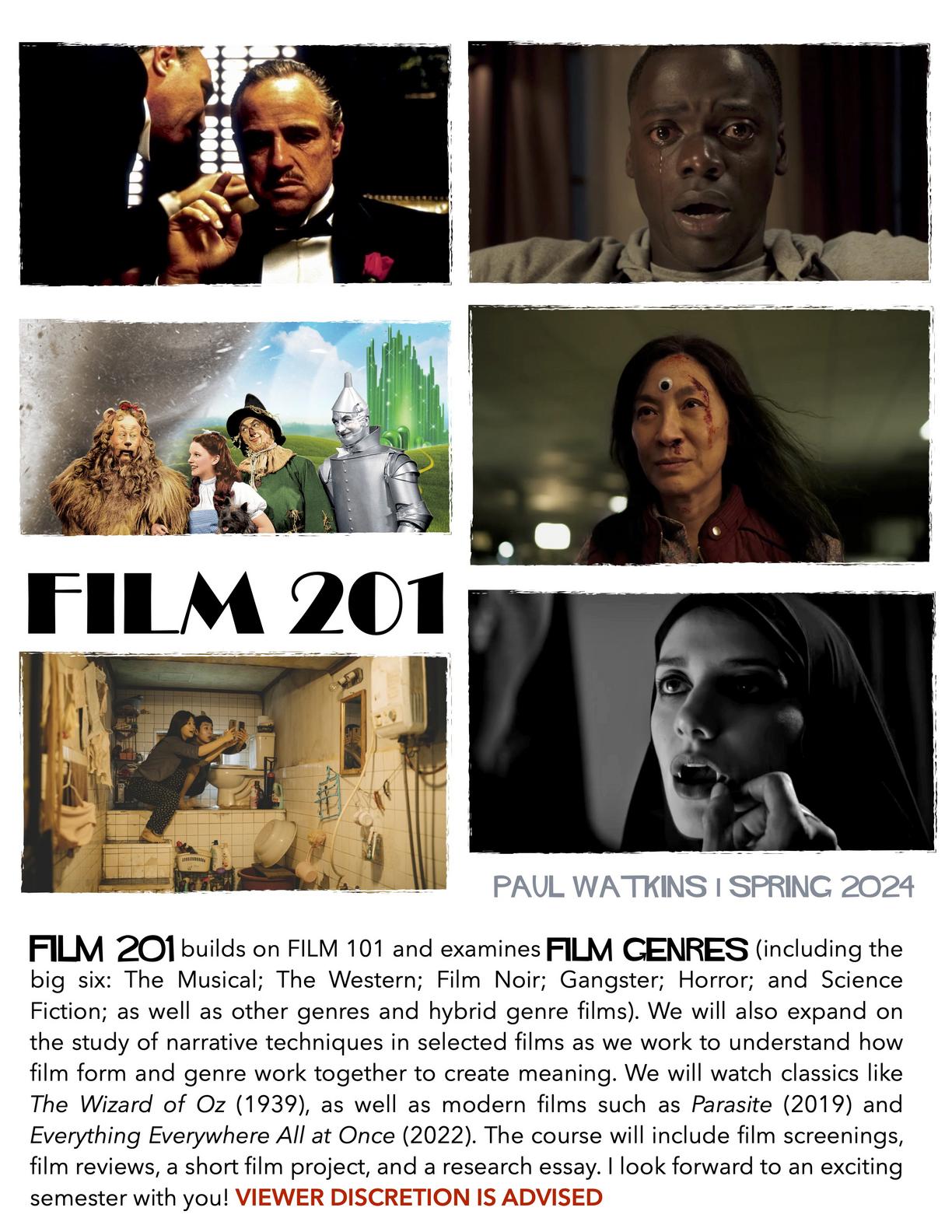Fall 2023
| Course Number | Course Description | Professor |
|---|---|---|
| 203 | Intermediate Academic Writing | Smith |
| 204 | Business and Technical Writing | Multiple Instructors |
| 208 | Introduction to Public Speaking | Multiple Instructors |
| 220 | Canadian Literature in Context | Torkko |
| 222 | Introduction to World Literature | Stephens |
| 230 | Literature and Popular Culture | Hagan |
| 231 | Speculative Literature | Atkinson |
| 273 | Ancients and Moderns | Crover |
Spring 2024
| Course Number | Course Description | Professor |
|---|---|---|
| 204 | Business and Technical Writing | Multiple Instructors |
| 208 | Introduction to Public Speaking | Multiple Instructors |
| 221 | North American Indigenous Literatures | Horsburgh |
| 232 | Children's Literature | Grafton |
| 240 | Ways of Reading | Carpentier |
| 274 | Literary Traditions | Hagan |
| 280 | Book Club | Torkko |
| FILM 201 | Film Studies | Watkins |
Fall 2023 – Course Descriptions
ENGL 203: Intermediate Academic Writing
Professor Toni Smith
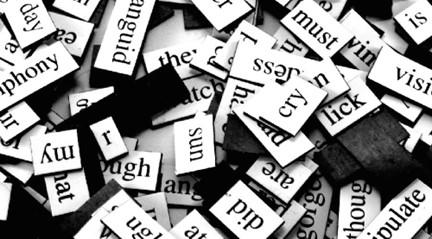
Academic writing is a unique genre that asks us to enter into ongoing conversations about important issues. Skilled writers are able to simultaneously juggle multiple sources—voices in the conversation—with their own focused arguments in a seamless, engaging way. Improve your academic essay-writing skills in this practical class, where we’ll learn the tips and techniques that enable you to gain confidence in managing more complex essay assignments.
ENGL 204: Business and Technical Writing
Multiple Sections

An introduction to business and technical communication skills with a focus on documents (such as letters and reports) and presentations. Topics may include planning, outlining, summarizing, presenting data, handling references, and editing. The course comprises several practical assignments, including a formal report and an oral presentation. ENGL 204 was formerly called ENGL 225; credit will not be granted for both courses.
ENGL 208: Introduction to Public Speaking
Multiple Sections

An introduction to public speaking that focuses on the creation, organization, and delivery of speeches for non-dramatic purposes. It provides the rhetorical principles of effective and ethical public speaking, offers opportunities to become familiar with different speaking situations, and attempts to instill a sense of the importance of public speech. ENGL 208 was formerly called THEA 203; credit will not be granted for both courses.
ENGL 220: Canadian Literature in Context
Professor Deb Torkko
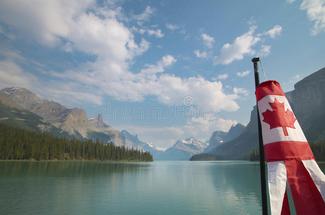
Stories are our first maps.
~~ Robert Bringhurst
Canadian fiction has long been defined by its representation and exploration of a complex relationship between its cultural imagination and its connection with the land. This course examines a selection of texts that reveal Canada’s many geographical regions. The range of fictional settings includes British Columbia, the Prairies, Ontario, the North, and Atlantic Canada. We will chart the ways in which land becomes metaphor in a wide range of fictional settings – islands, forests, mountains, glaciers, prairie fields, rivers, and urban centres. We will consider the ways in which place has character and exerts itself on characters. We will explore the questions these texts raise concerning the relationships between land, place, memory, and culture; between history and folklore; and between the real and the magically real. Canada’s novelists are storytellers who explore the history, geography, and imagination of a country, and we will consider how their stories create an impression of place and provide an alternative map – a literary map – of Canada. Selected texts may include some of the following: Laura Moss and Cynthia Sugars, Canadian Literature in English: Texts and Contexts, Volume II; Jack Hodgins, The Invention of the World; Thomas Wharton, Icefields; Margaret Sweetman, When Alice Lay Down With Peter; Richard Wagamese, Medicine Walk, Aritha Van Herk, Places Far From Ellesmere; Lee Maracle, Ravensong; Jane Urquhart, The Whirlpool; Michael Crummey, Sweetland; Catherine Bush, Blaze Island.
ENGL 222: Introduction to World Literature
Professor Melissa Stephens
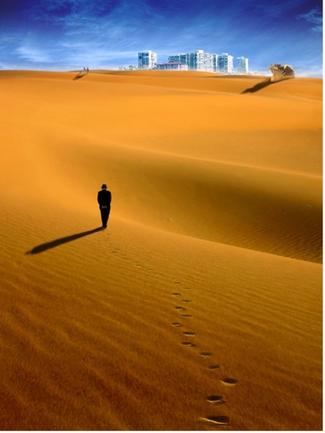
This course explores how global topics of illness, ecology, militarism, colonialism, gender diversity, and labour unsettle perceptions and feelings of “home.” All materials will be written in or translated into English and there will be emphasis placed on regions other than Canada, Britain, and the United States. Genre, period, and nationality will vary. Students may engage with works connected to the United Arab Emirates, the Marshall Islands, the Dominican Republic, India, Kenya, Nigeria, Czech Republic, and elsewhere.
ENGL 230: Literature and Popular Culture
Professor Sandra Hagan
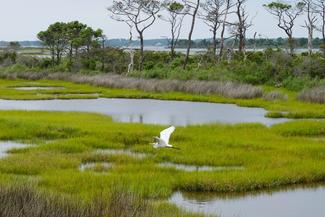
THE 21st-CENTURY SENSATION NOVEL
In seeking to define chick noir—a new publishing phenomenon that emerged a decade ago—one journalist described these books as “thrillers thrown into the domestic sphere, tales of intimate betrayal and mistrust.”[1] Critics of popular culture looking farther back to the Victorian era would have found a ready-made term for such domestic thrillers: the sensation novel. Emerging in 1860s Britain from a society in flux, the sensation novel capitalized on cultural realities like first-wave feminism, Darwinism, and mass market publishing. It offered a voracious reading public stories that served up one part bigamy and one part danger; some drugs, disguise, and fine furnishings; and a series of strange coincidences that kept them returning for more. In this course, we’ll trace a direct line from the 19th-century sensation novel to current chick noir bestsellers and investigate the ways that, like the Victorian sensation novel, they upend the comfortable domestic sphere. Readings are likely to include Thomas Hardy’s sensation novel Desperate Remedies and contemporary bestsellers The Guest List, Where the Crawdads Sing, and Gone Girl.
[1] Rosamund Urwin qtd. in Lucie Whitehouse. “The Rise of the Marriage Thriller.” The Guardian, 15 Jan. 2014, https://www.theguardian.com/books/booksblog/2014/jan/15/rise-marriage-t…
ENGL 231: Speculative Literature
Professor Anna Atkinson

English 231: Post-Carbon Fiction
This course begins with the understanding that fossil fuels are not only planet-killers in their contributions to Climate Change, but also finite resources. This means that, whether we like it or not, and whether we’re ready to face it or not, eventually our society will not be able to run on oil because there simply won’t be enough of it. This is the natural conclusion of a theory called “peak oil.” That term: "peak oil"--usually means something quite different from what people assume it means. Because of this, we will start the course with a close look at this term. Then we'll start looking at the ways in which various authors have imagined what a world beyond an industrial petroculture actually could look like. The approach we'll take has its roots in something Margaret Atwood said in a Quill and Quire interview in 1985 about her novel The Handmaid's Tale: "There is nothing in this book that hasn't already happened." In fact, apart from what Atwood terms "talking squids in space," there is very little in most speculative social science fiction that hasn't already happened--or that couldn't happen (or happen again). Thus, we’ll be looking, in the texts we read, for reflections of our own culture—and the implications of seeing (or not seeing) what these text reveal. What texts? Everything from E. M. Forster’s “The Machine Stops” to Octavia Butler’s Parable of the Sower to Douglas Coupland’s Player One to Suzanne Collins’s Hunger Games and beyond.
ENGL 273: Ancients and Moderns
Professor Sarah Crover
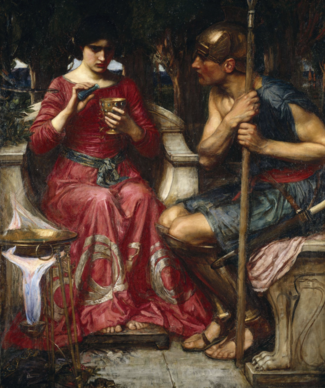
273: Dubious Heroes and Irresistible Villains
What does it mean to be heroic? Can a woman be a ‘hero’ in the traditional sense? Can villains be noble or heroes despicable? What happens when your race or origin marks you as a potential monster in the eyes of the community that surrounds you? How has the definition of the heroic and the villainous shifted over time? This course will explore depictions of unlikely or dubious hero/ines and charismatic villains. That is, it will focus on texts that choose figures as heroes that for one reason or another – their gender, their race, their species, their morality etc. – unsettle received notions of what dominant culture has decreed ‘ought’ to make up a heroic or villainous figure.
As a class we will trace what it means, then and now, to be ‘bad’ or ‘good’ and how our unexamined cultural assumptions reveal the slippage in these seemingly categorically opposed character identities. Possible texts under consideration include Medea, Othello, Frankenstein, The Golden Compass, and Green Grass Running Water.
Spring 2024 – Course Descriptions
ENGL 204: Business and Technical Writing
Multiple Sections

An introduction to business and technical communication skills with a focus on documents (such as letters and reports) and presentations. Topics may include planning, outlining, summarizing, presenting data, handling references, and editing. The course comprises several practical assignments, including a formal report and an oral presentation. ENGL 204 was formerly called ENGL 225; credit will not be granted for both courses.
ENGL 208: Introduction to Public Speaking
Multiple Sections

An introduction to public speaking that focuses on the creation, organization, and delivery of speeches for non-dramatic purposes. It provides the rhetorical principles of effective and ethical public speaking, offers opportunities to become familiar with different speaking situations, and attempts to instil a sense of the importance of public speech. ENGL 208 was formerly called THEA 203; credit will not be granted for both courses.
ENGL 221: North American Indigenous Literatures
Professor Amelia Horsburgh
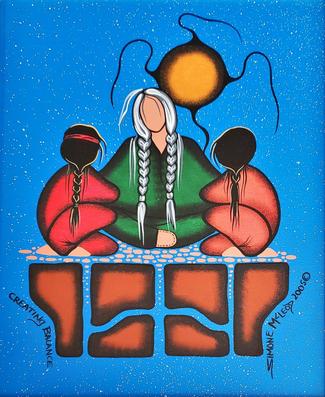
Family, community, and kinship is the focus of this course, where students work towards a more nuanced understanding of settler privilege, intergenerational trauma, the National Inquiry into Missing and Murdered Indigenous Women and Girls, and the Calls to Action of the Truth and Reconciliation Commission of Canada. Primary texts may include Indigenous authors such as Eden Robinson (Haisla and Heiltsuk First Nations), Gregory Scofield (Red River Métis), Tanya Tagaq (Inuit), Joshua Whitehead (Peguis First Nation) and Maria Campbell (Cree-Métis). Selected Indigenous scholarship may include Alicia Elliott’s (Tuscarora) A Mind Spread Out on the Ground, Daniel Heath Justice’s (Cherokee Nation) Why Indigenous Literatures Matter and the collection Reasoning Together: The Native Critics Collective.
Citation for the original work of visual art:
McLeod, Simone. Creating Balance. 2005, acrylic on canvas. Private collection.
ENGL 232: Children's Literature
A Different Kind of Eco-Text
Professor Janet Grafton
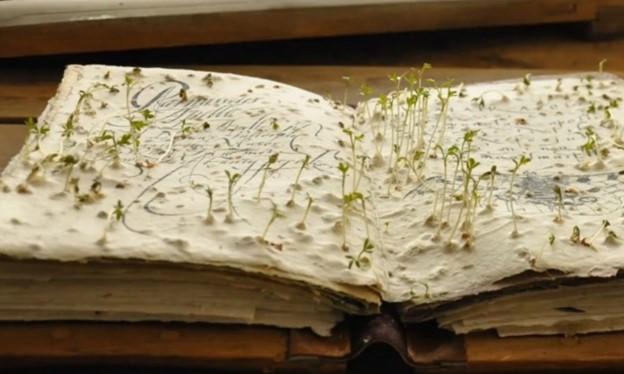
A recent proliferation of eco-texts – that is, literature that purports to teach environmental issues – speaks to the exigency of the environmental crisis. While exposure to these issues is critical to developing awareness, young learners are often overburdened with crisis-based facts about the state of our world. In this class, an affective, indirect approach is proposed as a means of navigating contemporary environmental crises. With this approach, we will work expand the definition and function of eco-text, most notably by positioning historical texts more centrally in the conversation. Our inquiry will draw from a range of perspectives and genres, and we will explore the ways that children’s texts from or set in the past can provide young readers with a pathway to critically investigate contemporary environmental concerns from a diverse, regenerative space.
ENGL 240: Ways of Reading
Professor Sally Carpentier

This course provides an introduction to the ways in which a particular text can be read critically. The course is both theoretical and practical. Students will learn the critical vocabulary associated with a particular theoretical approach and then apply it in their readings of one text. No prior knowledge of theory is necessary; however, by the time the course is over, students will be equipped to read a variety of texts in multiple ways, regardless of the discipline (anthropology, criminology, philosophy, psychology) to which their career paths will lead. The course will be structured in such a way that students will have the opportunity to share their research with their classmates and to pursue areas dictated by their own interests or chosen career fields. This course is also a requirement for those planning on pursuing a major or a minor in English and would be of benefit for students intending on pursuing advanced studies in any of the disciplines.
Image: Annie Spratt, Unsplash
ENGL 274: Literary Traditions
Professor Sandra Hagan
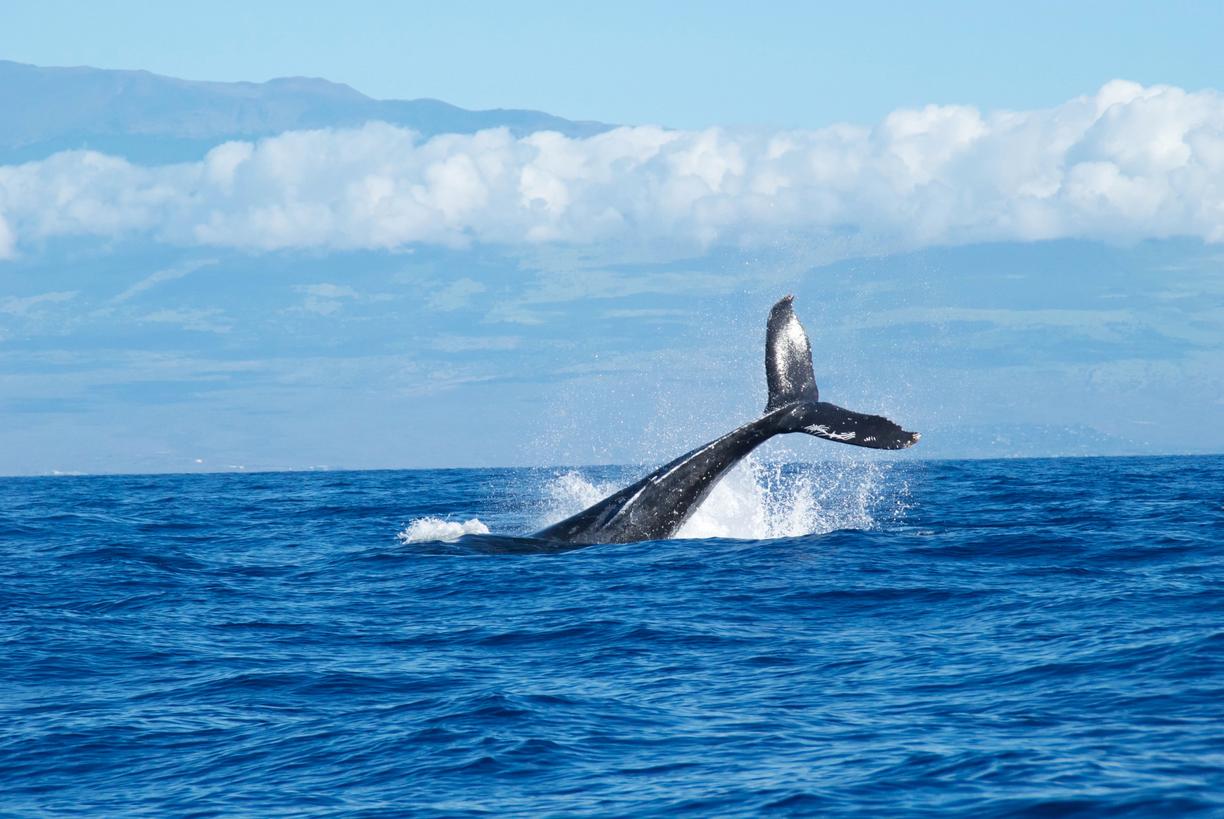
STORIES OF THE SEA
In The Sea: a Cultural History, John Mack argues for the distinctive experience of life on the oceans. Considering the sea as a place in itself rather than a gap between places opens up new possibilities for exploring human identities. In this course, we will trace out both the ways in which literary tradition has shaped representations of the seas at given periods and the ways in which oceanic tales offer access to extraordinary regions of human experience. Since as Mack notes, the seas are “arenas of transnational interchange,” we will navigate our way through texts launched from nations such as Canada, the UK, the US, and France, exploring where national borders sharpen and blur both on the seas and in ports of call (21). Themes will include colonialism, migration, survival, technology, the supernatural, and storytelling.
Texts may include Equiano’s The Interesting Narrative of the Life of Olaudah Equiano (selected chapters), Verne’s Twenty Thousand Leagues Under the Sea, Birch’s Jamrach’s Menagerie, Thúy’s Ru, and the film Jaws, along with other short readings, poems—and of course, a sea shanty or two!
ENGL 280: Book Club
Professor Deb Torkko
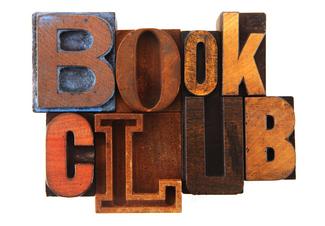
Ultimately there is no test of literary merit except survival, which is itself an index to majority opinion.
– George Orwell
They can educate, delight, misinform, console, or simply pass the time. They share our vacations, accompany us through delays at the airport, help us escape from or bring us closer to the world we inhabit. Whether historical fiction, mystery novels, tales of glamour, or family sagas, for example, best sellers are an important part of the popular culture. Best sellers speak to national myths, shape tastes and values, and construct pictures of the world and the people who inhabit it.
This course asks you what kinds of books you enjoy reading: fiction, non-fiction, poetry? Which authors would you most recommend to friends, and which would you warn friends away from? What do you particularly like or dislike about these books? What kinds of books would you like to see more of? Why? This course also asks what the trends are today, and what do these tell us about the kinds of characters, settings, circumstances, and ideas readers are drawn to. In our examination of the books we love to read, we will consider the role literary awards plays in shaping trends, and we will consider the distinctions made between good literature (the literary novel) and literary pulp (popular fiction), asking how do we distinguish between the two? A novel absorbs us not only because of its content but because of how it is written. To this end, then, our discussions will emphasize form, style, and technique and will appeal to anyone who is interested in close reading. Our readings will be drawn from national and international bestseller lists and student-selected texts.
FILM 201: Film Studies
Professor Paul Watkins
